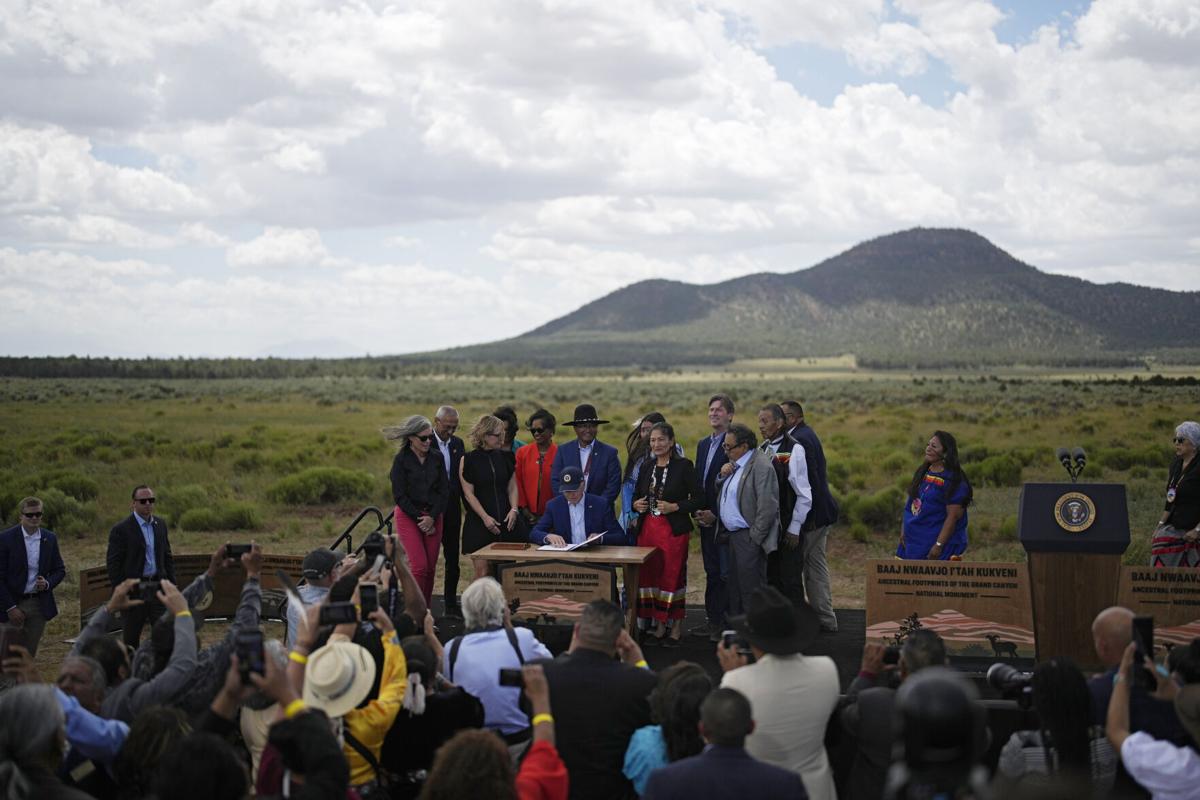The stage is set for a legal fight between Gov. Katie Hobbs and the Republican-controlled Legislature over the Biden administration’s creation of a national monument in Arizona.
In a new order, U.S. District Court Judge Stephen McNamee rejected arguments by GOP legislative leaders that they need to do battle only with the federal government in their bid to overturn the Baaj Nwaavjo I’tah Kukveni Ancestral Footprints of the Grand Canyon National Monument.
He said the interests of the governor and Attorney General Kris Mayes are different from those of the U.S. Department of Justice. McNamee said the federal attorneys have a single goal: defending the constitutionality of the president’s decision to designate nearly a million acres of federal land near the Grand Canyon as a national monument.
By contrast, the judge said, Hobbs and Mayes have a different legal theory.
The two Democrats contend that they — not the Legislature — have the sole right to file litigation objecting to the monument on behalf of the interests of the state. They say it is the executive branch of state government, run by Hobbs, that gets to decide whether the formation of the monument will aid or harm the adjacent state trust lands, not the Legislature.
Both Hobbs and Mayes support the Biden decision.
McNamee said they are entitled to seek to dismiss the legislators’ lawsuit. If he concludes the Legislature lacks the authority to sue on behalf of the state, as Hobbs and Mayes argue, the judge could dismiss the case even without hearing arguments on the underlying question of whether Biden broke any laws in declaring the monument.
In filing suit earlier this year, Senate President Warren Petersen and House Speaker Ben Toma acknowledged that the 1906 federal Antiquities Act allows a president to set aside parcels of land for protection.
But their attorneys say such a proclamation has to be limited to historic landmarks, historic and prehistoric structures and other objects of historic or scientific interest. They argue such designations have to be confined to the “smallest area compatible’’ with the care and management of the items to be protected.
They say the moment, at 1,462 square miles, meets neither requirement.
“Congress passed the Antiquities Act to protect just that: antiquities,’’ the lawsuit says. “It did not pass the law to allow the Biden administration to declare every inch of federal land a federal forest, cut off from all but those it selects.’’
The Biden administration is fighting back.
Michael Sawyer, a senior attorney in the Justice Department, said state lawmakers lack standing to bring a claim in federal court over creation of the monument.
Ultimately, he said, only Congress can override a presidential declaration of a monument. Congress knows it has that power and has used it, he said.
In fact, the first reversal occurred in Arizona.
In 1914 President Woodrow Wilson created the 2,000-acre Papago Saguaro National Monument, an area on the eastern edge of Phoenix known for its sandstone buttes and giant cacti. But there were issues, including vandalism.
So in 1930 Congress abolished the monument. Some of the area now houses the Phoenix Zoo, the Botanical Gardens, trails and the pyramid-shaped tomb of George W.P. Hunt, the state’s first governor.
But McNamee may not need to address the question of who can undo a monument. That relates directly to his allowing Hobbs and Mayes to intervene.
They told the judge he should toss the case without considering the arguments raised by Petersen and Toma. The two lawmakers had no legal right to file suit, they said.
“The state of Arizona itself — represented by the attorney general — holds the general power to sue (or not sue) based on alleged harms to the state,’’ they said. That specifically includes the right to protest the interests of state lands as well as the money the state gets from leases, they said; Petersen and Toma contend creation of the monument harms the value of trust lands.
“Arizona has designated the attorney general to represent the state on any case brought in federal court,’’ Hobbs and Mayes said in their legal filings. “Arizona also designates one official to speak on behalf of the state to the federal government: the governor. Gov. Hobbs did just that when she encouraged the federal government to establish the Ancestral Footprints Monument.’’
McNamee, in his new order, said Hobbs and Mayes are entitled to be in his court to make those arguments.
The judge was not so accommodating to requests by the Navajo, Hopi and Havasupai tribes to also play a role in defending the monument.
He acknowledged that the lands at issue are within the tribes’ homelands and that they were involved in advocating the monument’s creation.
But McNamee said their interests in protecting the area are the same as the Biden administration’s, and that the Justice Department can represent those interests.
For the same reason, the judge rejected the bid of 10 environmental groups to also be parties to the litigation.
No date has been set for a trial.
Get your morning recap of today's local news and read the full stories here: tucne.ws/morning





